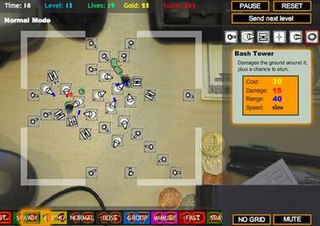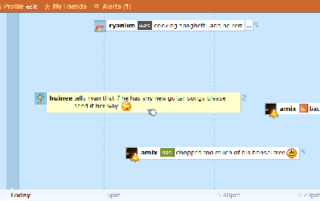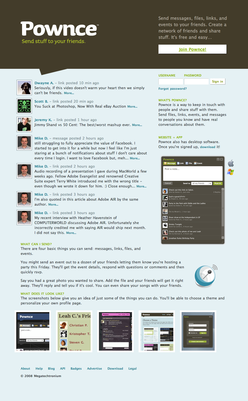History
Its launch, on June 27, 2007, was covered by Wired , [5] Business Week , [6] Webware , [7] [8] and the San Francisco Chronicle , [9] with most of the coverage focusing on Rose, known for his involvement in Digg, Revision3 and TechTV. Due to this media exposure, invitations for Pownce were in high demand and were being sold on sites such as eBay. [6]
On October 30, 2007, Pownce launched their public API. [10] The developers have also created a Pownce API Google Group. [11] Originally, it was primarily for discussing the release of the API, but it later served to gather feedback and help developers. On November 12, 2007 Pownce launched a custom theme editor for Pro users. [12] They also added eight more preset themes for non pro users to use. On December 20, 2007 Pownce launched a mobile version of their service. [13] This version could be accessed from a variety of mobile devices at m.pownce.com.
On December 1, 2008, Pownce announced that they had been acquired and were shutting down the site, [14] due to a lack of revenue, stagnant growth, and an inability to compete with Twitter. [15] Two weeks later, the site was taken offline. [16]

Six Apart Ltd., sometimes abbreviated 6A, is a software company known for creating the Movable Type blogware, TypePad blog hosting service, and Vox. The company also is the former owner of LiveJournal. Six Apart is headquartered in Tokyo. The name is a reference to the six-day age difference between its formerly married co-founders, Ben and Mena Trott.

Google Reader is a discontinued RSS/Atom feed aggregator operated by Google. It was created in early 2005 by Google engineer Chris Wetherell and launched on October 7, 2005, through Google Labs. Google Reader grew in popularity to support a number of programs which used it as a platform for serving news and information to users. Google shut down Google Reader on July 1, 2013, citing declining use.

Buzz Out Loud, "CNET's podcast of indeterminate length," or BOL, as it is affectionately titled by its fans, was a podcast about technology produced by CNET. The podcast was released daily on weekdays for the majority of its run, and weekly on Thursdays near its end. At its inception, the show was hosted by Tom Merritt and Molly Wood. Later in the shows life, other hosts, producers and guests appeared on the show although throughout most of its life, the show had either Tom, Molly or both hosting.
EditGrid was a Web 2.0 spreadsheet service, operated via Internet access. It offered both a free-of-charge service to personal users and a subscription service to organizations and was available on a number of partner sites and channels.
Feedburner, Inc. is a web feed management service primarily for monetizing RSS feeds, primarily by inserting targeted advertisements into them. It was founded in 2004 and acquired by Google in 2007.

Jay Steven Adelson is an American Internet entrepreneur. In 2014 Adelson co-founded Center Electric with Andy Smith. In 2013 he founded Opsmatic, a technology company that improves productivity on operations teams. In 2015 Opsmatic was bought by New Relic. Adelson's Internet career includes Netcom, DEC's Palo Alto Internet Exchange, co-founder of Equinix, Revision3 and Digg, and CEO of SimpleGeo, Inc. In 2008, Adelson was named a member of Time Magazine's Top 100 Most Influential People in the World and was listed as a finalist on the same list in 2009.

Kevin Rose is an American Internet entrepreneur who co-founded Revision3, Digg, Pownce, and Milk. He also served as production assistant and co-host at TechTV's The Screen Savers. From 2012 to 2015, he was a venture partner at GV.

Jaiku was a social networking, micro-blogging and lifestreaming service comparable to Twitter, founded a month before the latter. Jaiku was founded in February 2006 by Jyri Engeström and Petteri Koponen from Finland and launched in July of that year. It was purchased by Google on October 9, 2007.

Digg was an American news aggregator with a curated front page, aiming to select articles specifically for the Internet audience such as science, trending political issues, and viral Internet issues. It was launched in its current form on July 31, 2012, with support for sharing content to other social platforms such as Twitter and Facebook.
Microblogging is a form of blogging using short posts without titles known as microposts. Microblogs "allow users to exchange small elements of content such as short sentences, individual images, or video links", which may be the major reason for their popularity. Some popular social networks such as X (Twitter), Threads, Mastodon, Tumblr, Koo, and Instagram can be viewed as collections of microblogs.

Desktop Tower Defense is a Flash-based tower defense browser game created by Paul Preece in March 2007. The game had been played over 15.7 million times as of July 2007, and was one of Webware 100's top ten entertainment web applications of 2007. Desktop Tower Defense is available in an English, Spanish, German, French, or Italian interface. In May 2009, a commercial Nintendo DS version became available.
PostRank was a social media analytics service that used a proprietary ranking algorithm to measure "social engagement" with published content based on blog comments and links, Internet bookmarks, clicks, page views, and activities from social network services such as Twitter, Digg, Facebook and Myspace. In June 2011, PostRank was acquired by Google.

Rafe Needleman is a magazine and website editor and published author. He wrote a Star Trek trivia book in 1980 and has covered technology and business since 1988. Previously a co-host of CNET's Buzz Out Loud Daily Podcast with Molly Wood, and CNET's To The Rescue and the Reporters Roundtable podcast and maintains the blog Rafe's Radar. Rafe left CNET in August 2012 to become the Platform Advocate at Evernote. On January 7, 2014, he posted on his Google+ account, "I can finally announce my new job. I’m going to Yahoo. I’ll be editorial director of the new Yahoo Tech site..."
Critical Metrics was a web-based music recommendation service. Unlike user-driven sites like The Hype Machine and Pandora, Critical Metrics featured only expert-generated content. Aggregating reviews and playlists from over 150 publications, both print and online, the site also encompassed historical sources. The site then ranked the songs mathematically, based on the information gathered. With a methodology based in the fields of bibliometrics and sentiment analysis, Critical Metrics quantified these positive citations and sentiments into indices for media playlisting and consumption.

Drop.io was an online file sharing service. It allowed users to quickly create "drops", which could contain files of any type, and could be accessed via the internet, e-mail, phone, fax, and widgets. The service did not require users to sign up for an account, and each drop was private unless the creator chose to share it. Drop.io was named one of Time magazine's 50 Best Websites of 2009, and CNET Webware 100.
Ping.fm was an advertising-supported social networking and micro-blogging web service that enabled users to post to multiple social networks simultaneously.

Plurk is a free social networking and micro-blogging service that allows users to send updates through short messages or links, which can be up to 360 text characters in length.

Posterous was a simple blogging platform started in May 2008. It supported integrated and automatic posting to other social media tools such as Flickr, Twitter, and Facebook, a built-in Google Analytics package, and custom themes. It was based in San Francisco and funded by Y Combinator.
ShareThis is a technology company headquartered in Palo Alto, CA, with offices in New York, Chicago, and Los Angeles. It offers free website tools and plugins for online content creators. ShareThis collects data on user behavior, and provides this to advertisers and technology companies for ad targeting, analytics, and customer acquisition purposes. ShareThis has an exclusive license with the University of Illinois for patent applications made by co-founder David E. Goldberg. The patents include genetic algorithms and machine learning technologies used for the purposes of information collection and discovery based on a user's sharing behavior.

Leah Culver is a computer programmer, startup founder, and angel investor.














